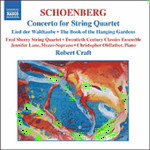
Schoenberg: Concerto for String Quartet / The Book of the Hanging Gardens, Op. 15
 $25.00
Low Stock
add to cart
$25.00
Low Stock
add to cart
ARNOLD SCHOENBERG
Schoenberg: Concerto for String Quartet / The Book of the Hanging Gardens, Op. 15
Fred Sherry Quartet / Twentieth Century Classics Ensemble / Robert Craft
[ Naxos Schoenberg Edition Vol 2 / CD ]
Release Date: Friday 10 August 2007
Should this item be out of stock at the time of your order, we would expect to be able to supply it to you within 2 - 5 business days.
"When you consider that this disc gives almost eighty minutes of music, including a rarely performed work in what Robert Craft describes as an unmatched performance, plus three other pieces and an interview, all for a super-budget price then it is irresistible. I hope there are many others who will, like me, change their opinions of this icon of twentieth century music. For my part I am now ready to take on his other works and am sure I will not find them anywhere near as daunting as I used to do. Thanks once again Naxos!"
(MusicWeb March 2005)
"Superb singing dominates the new Schoenberg CD, which features the mezzo-soprano Jennifer Lane in performances of "The Book of the Hanging Gardens," with Mr. Oldfather as pianist, and of Schoenberg's luminous chamber orchestra arrangement of the "Song of the Wood Dove" from "Gurrelieder."
"The Book of the Hanging Gardens," a setting of stiflingly humid (rather than torrid) love poems by Stefan George, marked Schoenberg's leap from traditional tonality. Despite their historical importance, and even though they were not intended as Schoenberg's lullaby, these songs are soporific in spite of themselves.
For once, Ms. Lane and Mr. Oldfather enliven the cycle, articulating the suppressed eroticism and anxiety of an affair that seems to go nowhere. Although you can also hear Ms. Lane's dramatic portrayal of the Wood Dove in Mr. Craft's complete recording of "Gurrelieder," you may very well prefer to hear the work's essence in this finely shaped aria.
Schoenberg is sometimes hardest to take when you think he is easiest. His orchestrations of Bach and Brahms seem intended to violate notions of good taste you didn't even suspect you had.
More discomforting still is his Concerto for String Quartet and Orchestra, from 1933. This is not, at first blush, an original composition. Based on a Handel concerto grosso (Op. 6, No. 7), which Schoenberg "freely transcribed and developed," it was a sequel to the arrangement of a cello concerto by Matthias Georg Monn that Schoenberg had made the previous year for Pablo Casals.
If that work challenged the technique of a Casals, the string quartet concerto seems to call for four Paganini impersonators. Jennifer Frautschi, Jesse Mills, Mr. O'Neill and Mr. Sherry, teamed here as the Fred Sherry Quartet, sound up to the job - and a wild and crazy job it is. As in the cello concerto, Schoenberg scatters his virtuosic challenges as if by random. All of a sudden, and for no apparent reason, the soloists burst into a volley of triple stops or harmonics.
In the first two movements Schoenberg is relatively restrained. If you follow Handel's score you will not be too surprised except for one outburst of dissonance, which seems to have jumped ship from "Moses and Aron."
But in the last two movements, Schoenberg develops Handel with a vengeance. He turns the sweet tune of the Allegro grazioso into a Hungarian march à la Glazunov, interspersed with anxious episodes that forecast Alfred Schnittke. The closing hornpipe continues the radical makeover.
High anxiety was not at all out of order in 1933. You just don't expect to hear it grafted onto such a jolly original."
--Review by David Schiff- "Still Turning Provocations Into Classics", The New York Times, Sunday, March 13th, 2005
Tracks:
Concerto for String Quartet and Orchestra in B flat major (after Handel's Concerto Grosso, Op. 6/7)
Suite for Piano, Op. 25
Gurre-Lieder, Part I: Lied der Waldtaube (Song of Wood Dove) (version with chamber orchestra)
Das Buch der hangenden Garten, Op. 15
A Conversation with Arnold Schoenberg (July 1949)



